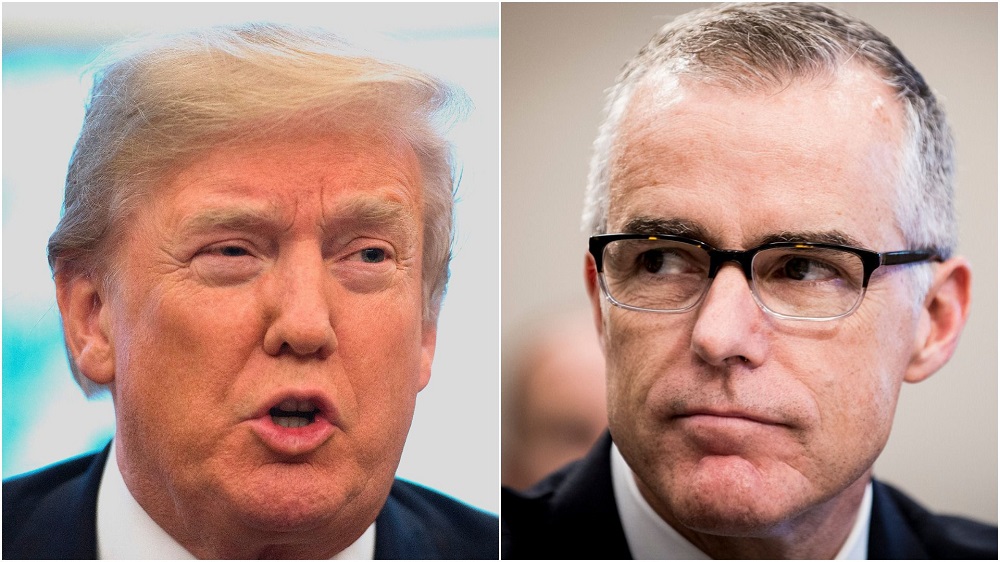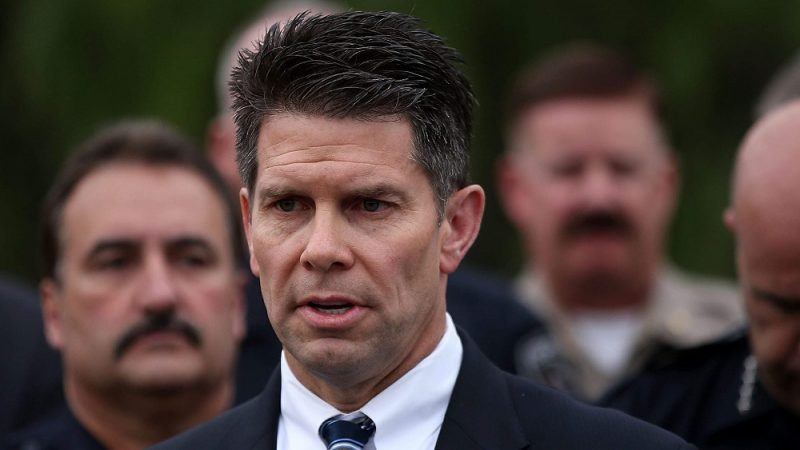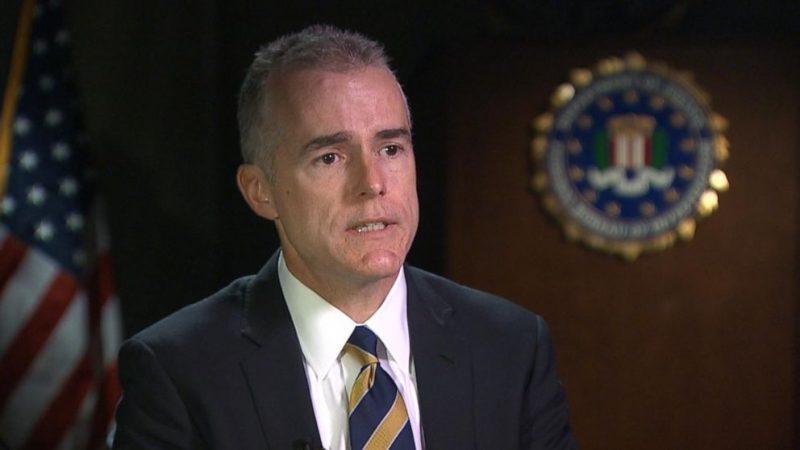
Donald Trump was absolutely gleeful on Twitter Friday before sending missiles into Syria later that evening when he felt vindicated by his assault on Andrew McCabe.
People are divided on the outcome of the report which you can see just below and even download for later reading. At the very end of this article you can find a simple breakdown of what the report finds fault with McCabe and his response. Then you can decide for yourself if this was worthy of firing him 26 hours before his official retirement time making it so he could not receive any benefits or pension after 20 year in the bureau.
Director Christopher Wray has now named Associate Deputy Director David Bowdich to McCabe’s vacant spot.
Bowdich previously served as assistant director in charge of the Los Angeles Field Office, where he oversaw investigations including the San Bernardino terror attack and the LAX active shooter investigation.
The Justice Department inspector general delivered to Congress on Friday a scathing report that accused Andrew G. McCabe, the former F.B.I. deputy director, of violating the federal law enforcement agency’s media policy and then repeatedly misleading investigators about his actions.
[pdf-embedder url=”https://movietvtechgeeks.com/wp-content/uploads/2018/04/inspector-general-andrew-mccabe-report-2018.pdf” title=”inspector general andrew mccabe report 2018″]
The inspector general found that Mr. McCabe, 50, had lacked candor on four occasions when questioned by investigators and faulted his decision to authorize the disclosure of information to a reporter with The Wall Street Journal in October 2016 as self-serving.
In a point-by-point rebuttal of the report, Mr. McCabe said that he had full authorization to share this information with the news media as deputy director and that he did not intentionally mislead investigators. He also argued that his decision to release information about an investigation into the financial dealings of the Clinton Foundation was justified and in the public’s interest.
Mr. McCabe, a 21-year F.B.I. veteran, was fired in March after Attorney General Jeff Sessions rejected an appeal that would have let him retire with a full government pension.
At the time, Mr. Sessions said that Mr. McCabe had repeatedly shown a lack of candor under oath. Mr. McCabe disputed that, saying his firing was meant to undermine the special counsel investigation being led by Robert S. Mueller III, and to discredit him as a witness.
The report’s release, which had been anticipated for months, comes at a time when the F.B.I. and the Justice Department are under intense scrutiny by Republicans on Capitol Hill and by President Trump for their continuing investigation of possible links between the Trump campaign and Russia. Mr. Trump, who considers the Russia investigation a “witch hunt,” has fumed in recent days after an F.B.I. raid of his personal lawyer’s office and hotel room in New York.
The inspector general’s report also provides the president and his allies with a convenient counterpoint to a new autobiography by James Comey, the F.B.I. director Mr. Trump fired last May. The book, “A Higher Loyalty: Truth, Lies, and Leadership,” is scheduled to be released on Tuesday, but details began to trickle out Thursday night, including pointed criticisms of Mr. Trump.
On Friday afternoon, Mr. Trump, who has sought to tarnish the reputation of his investigators, pounced on the report on Mr. McCabe, calling it a “total disaster.”
DOJ just issued the McCabe report – which is a total disaster. He LIED! LIED! LIED! McCabe was totally controlled by Comey – McCabe is Comey!! No collusion, all made up by this den of thieves and lowlifes!
— Donald J. Trump (@realDonaldTrump) April 13, 2018
“He LIED! LIED! LIED! McCabe was totally controlled by Comey – McCabe is Comey!! No collusion, all made up by this den of thieves and lowlifes!” he wrote on Twitter.
Michael R. Bromwich, a lawyer for Mr. McCabe, replied to the president’s tweet, writing in one of his own that his client was considering filing a defamation suit. “Stay tuned,” he wrote.
The inspector general report was unsparing in its assessment of Mr. McCabe. The review accused Mr. McCabe of lacking candor when he spoke to Mr. Comey shortly after the October 2016 article was published, when he spoke with F.B.I. investigators and then in two conversations with investigators for the inspector general.
Lack of candor, or knowingly providing false information, is a fireable offense at the F.B.I.
The inspector general said that when investigators asked whether Mr. McCabe had instructed a pair of aides to provide information in October 2016 to Devlin Barrett, then a Wall Street Journal reporter, Mr. McCabe said he did not authorize the disclosure and did not know who did.
Mr. McCabe subsequently said he approved the F.B.I.’s contact with the reporter, according to the review.
The newspaper article delved into a dispute between F.B.I. and Justice Department officials over how to proceed in the investigation into the Clinton Foundation. It revealed a meeting during which Justice Department officials declined to authorize subpoenas or grand jury activity. The article said that some F.B.I. agents thought that Mr. McCabe had slowed the investigation.
But The Journal, citing anonymous sources including “one person close to Mr. McCabe,” detailed a tense conversation with a senior Justice Department official in which Mr. McCabe insisted that the F.B.I. had the authority to press ahead with the investigation.
The inspector general concluded that that engagement initiated by Mr. McCabe had not been justified under the media policy of the F.B.I. and Justice Department and constituted misconduct.
Specifically, the report said, providing an anonymous quote about the content of a conversation between Mr. McCabe and another department official “served only to advance McCabe’s personal interests and not the public interest, as required by F.B.I. policy.”
Mr. McCabe disputed that conclusion, saying that he took the steps he did to protect the F.B.I.’s reputation. In his interactions with investigators, he said that he had not intended to mislead and in one case reached back out to the inspector general’s office to correct earlier comments.
The inspector general, Michael E. Horowitz, is expected to release a larger report in the coming weeks about the F.B.I.’s actions during the 2016 election.
The report on Friday generated split reaction on Capitol Hill. Top Republicans said that it clearly justified Mr. McCabe’s firing, and highlighted the importance of truthfulness in federal law enforcement. Democrats, while not disputing that point, warned that the report should not be connected to the Russia investigation.
Earlier on Friday, Christopher A. Wray, the director of the F.B.I., formally elevated David L. Bowdich, the bureau’s third in command, to succeed Mr. McCabe as deputy director. Mr. Bowdich, the former top agent in the Los Angeles Field Office, has been the acting deputy director since January.
McCabe’s attorney, Michael Bromwich, also released a statement following the report, arguing that the internal-review process that ended in McCabe’s firing was politicized. The president’s “comments have applied inappropriate pressure on [the IG] and DOJ more generally,” Bromwich’s statement reads. “No one, not even an independent Inspector General, is fully immune from the type of political pressure that has been applied in Mr. McCabe’s case.” Additionally, Bromwich announced McCabe’s intention to sue Trump and “other senior members of the administration” for “wrongful termination, defamation, Constitutional violations and more.”
The IG report concludes that McCabe lied under oath, a grave charge for a federal agent. But it doesn’t support Trump’s claims of bias. McCabe isn’t cast as a liberal partisan, nor is he shown as being particularly bound to Comey. Counter to Trump’s suggestion that McCabe was under Comey’s control, the report states that McCabe misled Comey about his role in the leak. (McCabe’s lawyers contend that he did not mislead investigators, and that the pre-firing review process was deliberately truncated because of political pressure from the president.)
The disclosure at the heart of the IG report appeared in an October 30, 2016 story in the Journal. The report states that, with the leak, McCabe was attempting to counter an emerging narrative on the right that he was responsible for the FBI delaying investigations into Clinton because of his wife’s ties to the Democratic Party. McCabe authorized the disclosure of a conversation he had with another Justice Department official to reporters. In that conversation, McCabe reportedly accused the official of telling him to “shut down a validly predicated investigation.” The report states that the official had “expressed concerns about FBI agents taking overt steps in the [Clinton Foundation] Investigation during the presidential campaign.”
That disclosure was self-serving, the IG said, and wasn’t in the interest of the FBI or the public. But the leak itself is less of an issue in the IG report than McCabe’s alleged attempts to conceal his role in it. The report states that shortly after the disclosure, at an October 31 staff meeting, McCabe gave Comey the impression that he played no role in the Journal story. Subsequently, the report states, McCabe misled internal investigators over a period of months about his involvement—including during interviews conducted under oath. In Bromwich’s telling, McCabe disclosed the information to protect the FBI “against false claims” of political bias, and the lack-of-candor charge was “more properly understood as the result of misunderstanding, miscommunication, and honest failures of recollection based on the swirl of events around him, statements which he subsequently corrected.”
According to the report, McCabe’s disclosure also “effectively confirmed the existence” of the Clinton Foundation probe, which Comey “had previously refused to do.” That kind of disclosure—affirming the existence of an FBI probe against a political candidate close to an election—is against longstanding Justice Department rules.
If those rules sound familiar, it’s because Comey, more famously, violated them. Just two days before the publication of the Journal story, and less than two weeks before the 2016 election, he revealed to Congress that the FBI had reopened its investigation into Clinton’s use of a private email system.
That fact highlights an additional irony. McCabe and Comey are both targets of Trump’s wrath, and are key figures in the alleged deep-state conspiracy against the White House. But they were both fired, ostensibly, because of their roles in disclosing information related to Clinton, not Trump. While the president ultimately admitted that he fired Comey because of the “Russia thing,” the White House initially argued it was because of his public handling of the Clinton email matter, which was separate from the foundation investigation.
Another similarity? In both cases, there were credible accusations of misconduct that critics allege were used as pretext for political retribution. The possibility that McCabe and Comey were punished for displeasing the president, rather than any abuse of authority, sends an alarming message: that under the Trump administration, the latter may be excused, but the former is unforgivable.
To Break This All Down Easily:
- As deputy director of the FBI, McCabe had oversight authority over all FBI investigations, including the Clinton email investigation and the Clinton Foundation investigation.
- A year earlier, McCabe’s wife had run as a Democrat for a state senate seat in Virginia. Like most Democratic candidates, she received money from a PAC controlled by Clinton pal Terry McAuliffe. During the 2016 presidential campaign, conservative media went berserk over this, claiming that McCabe had been influenced by his wife’s connections to go easy on Clinton.
- Near the end of the 2016 campaign, the Wall Street Journal ran an article implying that McCabe had also tried to slow-walk the Clinton Foundation investigation.
- In fact, McCabe had done just the opposite: in a phone call with the Justice Department he had refused to allow any political interference with the investigation. A few days after the original article appeared, McCabe authorized an FBI press liaison to tell this to the Journal on background for a follow-up article that appeared on October 30.
Everyone accepts this as the basic background of the case. What’s more, as deputy director, McCabe was authorized to speak to the press on background or to allow others to do it for him. The question is: did McCabe lie about authorizing this disclosure to the Journal? The inspector general says he did, and lays out the following timeline:
October 31, 2016: McCabe speaks to FBI Director James Comey about the Journal article. McCabe says he told Comey what he had done. Comey says he didn’t.
May 9, 2017: The FBI inspection division, which is investigating a series of leaks, talks to McCabe. McCabe says he doesn’t know where this particular leak came from.
July 28, 2017: The DOJ inspector general interviews McCabe, who says he doesn’t know who authorized the press liaison to talk to the Journal.
August 1, 2017: McCabe calls the inspector general to change his testimony. He now says that he recalls authorizing the disclosure.
August 18, 2017: The FBI inspection division re-interviews McCabe, who confirms that he authorized the disclosure.
November 29: The inspector general interviews McCabe again. McCabe confirms yet again that he authorized the disclosure.
The inspector general’s report concludes that McCabe lied multiple times: to Comey (#1), to the FBI inspection division (#2), to the inspector general (#3), and finally on November 29 when he told the inspector general his version of the conversation with Comey (#6).
McCabe has defended himself against all the charges:
- He believes his recollection of the conversation with Comey is correct, and it’s Comey who is mistaken.
- He says that the May 9 interview was about an entirely different matter and touched on the Journal article only briefly. “That is reflected in the fact that in a 12-page draft statement prepared by INSD, the WSJ article occupied a single paragraph.” McCabe says he never meant to imply that he didn’t authorize the disclosure.
- He says the July 28 interview was primarily about the FBI’s overall handling of the Clinton email case. “The OIG investigators assured him they would not ask questions about matters that could involve him.” When they suddenly asked McCabe about the Journal article, “He attempted multiple times to end the discussion as quickly as possible.” That caused him to flub his response, and two days later he called back to correct his testimony.




